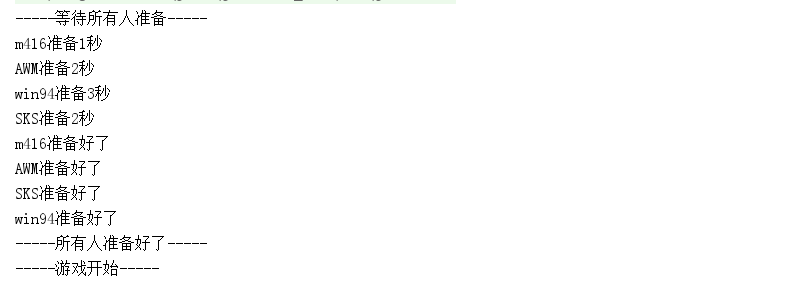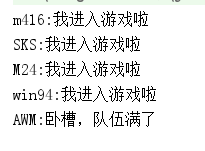java.util.concurrent并发包中提供了一系列的的同步工具类,这些基础类不管是否能在项目中使用到,了解一下使用方法和原理对java程序员来说都是有必要的。博主在看《java并发编程实战》这本书中提到了其中几个工具类,本文就对这些类进行简单的描述。
CyclicBarrier(栅栏)
4个朋友约好下班一起玩吃鸡,分别是M4,AWM,SKS,WIN94。这四个哥们下班时间不一样,决定好一个时间一起上号搞。

大家约好到家就开游戏,必须珍惜生命,争分夺秒玩游戏。

我们用栅栏来模仿一下场景:
1 public class CyclicBarrierTest { 2 3 private static CyclicBarrier barrier = new CyclicBarrier(4); 4 5 private static class EatChickenPlayer extends Thread { 6 7 private String name; 8 9 //下班时间 10 private Long offWorkTime; 11 12 public EatChickenPlayer(String name, Long time) { 13 this.name = name; 14 this.offWorkTime = time; 15 } 16 17 @Override 18 public void run() { 19 Timer timer = new Timer(); 20 timer.schedule(new TimerTask() { 21 @Override 22 public void run() { 23 System.out.println(name + ":我上号了"); 24 try { 25 barrier.await(); 26 System.out.println(name + ":开打开打"); 27 } catch (Exception e) { 28 e.printStackTrace(); 29 } 30 } 31 }, offWorkTime); 32 } 33 } 34 35 public static void main(String[] args) { 36 EatChickenPlayer m416 = new EatChickenPlayer("m416", 3000L); 37 EatChickenPlayer AWM = new EatChickenPlayer("AWM", 6000L); 38 EatChickenPlayer SKS = new EatChickenPlayer("SKS", 9000L); 39 EatChickenPlayer win94 = new EatChickenPlayer("win94", 4000L); 40 m416.start(); 41 AWM.start(); 42 SKS.start(); 43 win94.start(); 44 } 45 }
运行一下代码,感受一下,

栅栏通常阻塞一系列线程,当所有需要的线程都达到栅栏位置,才能继续执行。所以,栅栏可以理解为等待其他的线程到达对应的位置,在一起执行。
在做一些并发测试的时候,有时候需要所有线程都执行到相应的位置,让它们同时执行。而且栅栏是可以重复利用的,当栅栏开放后,栅栏会进行重置,然后对后续的线程进行拦截。如果await调用超时,或者await的线程被中断,栅栏就被认为是打破了,所有await的线程都会中止并且抛出BrokenBarrierException。如果成功通过栅栏,那么await将为每个线程返回一个唯一的到达索引号,我们可以通过索引来选举一个领导线程。并在下一次循环中,通过领导线程执行一些特殊工作。
CountDownLatch(闭锁)
好不容易,四个人都到到齐了,纷纷上号。要进行游戏,必须等队伍里所有人都点击准备完成,游戏才能开始。这种时候可以时候,我们可以使用闭锁来实现这种业务场景。

1 public class CountDownLatchTest { 2 3 private static CountDownLatch countDownLatch = new CountDownLatch(4); 4 5 public static class EatChicken extends Thread { 6 7 private String name; 8 9 private int time; 10 11 public EatChicken(String name, int time) { 12 this.name = name; 13 this.time = time; 14 } 15 16 @Override 17 public void run() { 18 System.out.println(name + "准备" + time + "秒"); 19 try { 20 SECONDS.sleep(time); 21 } catch (InterruptedException e) { 22 e.printStackTrace(); 23 } 24 System.out.println(name + "衣服换好了"); 25 countDownLatch.countDown(); 26 } 27 } 28 29 public static void main(String[] args) throws InterruptedException { 30 System.out.println("-----等待所有人准备-----"); 31 EatChicken m416 = new EatChicken("m416", 1); 32 EatChicken AWM = new EatChicken("AWM", 2); 33 EatChicken SKS = new EatChicken("SKS", 2); 34 EatChicken win94 = new EatChicken("win94", 3); 35 m416.start(); 36 AWM.start(); 37 SKS.start(); 38 win94.start(); 39 40 countDownLatch.await(); 41 System.out.println("-----所有人准备好了-----"); 42 System.out.println("-----游戏开始-----"); 43 }
运行程序:

闭锁初看跟栅栏非常相似,它们作为工具类,都能作为屏障,等待线程执行到一定的地方。闭锁跟栅栏的区别,就是闭锁是一次性的,当闭锁完全打开后就不能关闭了。栅栏打开之后,放行等待之后,栅栏就被重置,等待下一次开启。闭锁使用countDown()的时候,线程不会阻塞,继续运行。栅栏没有类似的countDown()方法,使用await()的时候,还需要等待的线程数-1,直到需要等待的线程数为0的时候,栅栏打开。
Semaphore(信号量)
有的时候,不仅这四位老哥去玩,时不时的M24也要来一起玩。这个时间,就只能大家一起抢位置了。没能挤进队伍的老哥内心百感交集,欲说还休。

我们可以用信号量来模拟。
1 public class SemaphoreTest { 2 3 private static Semaphore semaphore = new Semaphore(4); 4 5 private static class EatChickenPlayer extends Thread { 6 7 private String name; 8 9 10 public EatChickenPlayer(String name) { 11 this.name = name; 12 } 13 14 @Override 15 public void run() { 16 if (semaphore.tryAcquire()) { 17 System.out.println(name + ":我进入游戏啦"); 18 } else { 19 System.out.println(name + ":卧槽,队伍满了"); 20 } 21 } 22 } 23 24 public static void main(String[] args) throws InterruptedException { 25 EatChickenPlayer m416 = new EatChickenPlayer("m416"); 26 EatChickenPlayer AWM = new EatChickenPlayer("AWM"); 27 EatChickenPlayer SKS = new EatChickenPlayer("SKS"); 28 EatChickenPlayer win94 = new EatChickenPlayer("win94"); 29 EatChickenPlayer M24 = new EatChickenPlayer("M24"); 30 m416.start(); 31 AWM.start(); 32 SKS.start(); 33 win94.start(); 34 M24.start(); 35 }
运行一下代码:

信号量用来控制同时访问某特定资源的操作数量。通过acquire()阻塞获取资格。或者使用tryAcquire()方法获取,及时返回结果,获取权限成功则返回ture,获取失败返回false。当权限已经使用完毕后,调用release()或者release(int permits) 方法释放权限。
FutureTask
游戏终于开始了,落地的时候,发现有四个房子,四位胸怀吃鸡的老哥分配好各走一个房子收集里面的东西。收集出来之后一起分东西。这里把每个老哥去房子里舔装备作为一个Task。我们用FutureTask来模拟一下这个场景:
1 package com.chinaredstar.jc.lock; 2 3 import java.util.ArrayList; 4 import java.util.List; 5 import java.util.Map; 6 import java.util.Random; 7 import java.util.concurrent.*; 8 import java.util.stream.Collectors; 9 10 public class FutureTaskTest { 11 12 /** 13 * 固定的4线程,线程池 14 */ 15 private static ExecutorService threadPoolExecutor = Executors.newFixedThreadPool(4); 16 17 static class Equipment { 18 /** 19 * 这里简单模拟一下, 20 * 1、子弹 2、枪械 3、药包 21 */ 22 private Integer type; 23 24 /** 25 * 数量 26 */ 27 private Integer num; 28 29 public Equipment(Integer type, Integer num) { 30 this.type = type; 31 this.num = num; 32 } 33 34 public Integer getType() { 35 return type; 36 } 37 38 public void setType(Integer type) { 39 this.type = type; 40 } 41 42 public Integer getNum() { 43 return num; 44 } 45 46 public void setNum(Integer num) { 47 this.num = num; 48 } 49 50 51 } 52 53 /** 54 * 舔装备人物类 55 */ 56 static class CollectTask implements Callable { 57 private String name; 58 59 public CollectTask(String name) { 60 this.name = name; 61 } 62 63 @Override 64 public List<Equipment> call() throws Exception { 65 return generatorEquipment(name); 66 } 67 } 68 69 public static List<Equipment> generatorEquipment(String name) { 70 71 List<Equipment> list = new ArrayList<>(); 72 73 Random r = new Random(); 74 //子弹 75 Equipment bullet = new Equipment(1, r.nextInt(100)); 76 list.add(bullet); 77 System.out.println(name + ":捡到子弹" + bullet.num + "发"); 78 //枪 79 Equipment gun = new Equipment(2, r.nextInt(3)); 80 System.out.println(name + ":捡到枪" + gun.num + " 把"); 81 list.add(gun); 82 //药包 83 Equipment bandage = new Equipment(3, r.nextInt(10)); 84 System.out.println(name + ":捡到绷带" + bandage.num + " 个"); 85 list.add(bandage); 86 return list; 87 } 88 89 public static void main(String[] args) throws ExecutionException, InterruptedException { 90 //生成任务 91 CollectTask AWM = new CollectTask("AWM"); 92 CollectTask m416 = new CollectTask("m416"); 93 CollectTask SKS = new CollectTask("SKS"); 94 CollectTask win94 = new CollectTask("win94"); 95 //生成任务交给线程池 96 Future AWM_future = threadPoolExecutor.submit(AWM); 97 Future m416_future = threadPoolExecutor.submit(m416); 98 Future SKS_future = threadPoolExecutor.submit(SKS); 99 Future win94_future = threadPoolExecutor.submit(win94); 100 101 //结果放在一起 102 List<Future> futureList = new ArrayList<>(); 103 futureList.add(AWM_future); 104 futureList.add(m416_future); 105 futureList.add(SKS_future); 106 futureList.add(win94_future); 107 108 //结果统一在一起 109 List<Equipment> taskResultList = new ArrayList<>(); 110 for (Future<List<Equipment>> future : futureList) { 111 taskResultList.addAll(future.get()); 112 } 113 114 //打印出来看看都有些啥 115 Map<Integer, Integer> tolal = taskResultList.stream().collect(Collectors.groupingBy( 116 Equipment::getType, Collectors.summingInt(Equipment::getNum))); 117 tolal.entrySet(); 118 for (Map.Entry<Integer, Integer> entry : tolal.entrySet()) { 119 if (entry.getKey() == 1) { 120 System.out.println("总共有子弹:" + entry.getValue()); 121 } 122 if (entry.getKey() == 2) { 123 System.out.println("总共有枪:" + entry.getValue()); 124 } 125 if (entry.getKey() == 3) { 126 System.out.println("总共有药包:" + entry.getValue()); 127 } 128 } 129 130 } 131 132 }
运行后的代码结果:
